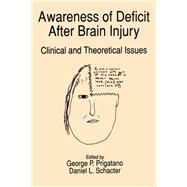
Note: Supplemental materials are not guaranteed with Rental or Used book purchases.
Purchase Benefits
What is included with this book?
| Introduction | |
| Anosognosia Related to Hemiplegia and Hemianopia | |
| Anosognosia of Linguistic Deficits in Patients with Neurological Deficits | |
| Anosognosia: Possible Neuropsychological Mechanisms | |
| Disturbance of Self-Awareness After Frontal System Damage | |
| Unawareness of Deficits in Dementia and Schizophrenia | |
| Disturbances of Self-Awareness of Deficit After Traumatic Brain Injury | |
| Unawareness of Deficit and Unawareness of Knowledge in Patients with Memory Disorders | |
| Three Possible Mechanisms of Unawareness of Deficit | |
| Reality Monitoring: Evidence from Confabulation in Organic Brain Disease Patients | |
| Anosognosia, Consciousness, and the Self | |
| The Role of Psychological Factors in Disordered Awareness | |
| Anosognosia and Denial of Illness | |
| Forms of Unawareness | |
| Table of Contents provided by Publisher. All Rights Reserved. |
The New copy of this book will include any supplemental materials advertised. Please check the title of the book to determine if it should include any access cards, study guides, lab manuals, CDs, etc.
The Used, Rental and eBook copies of this book are not guaranteed to include any supplemental materials. Typically, only the book itself is included. This is true even if the title states it includes any access cards, study guides, lab manuals, CDs, etc.